Spoiler: You’re probably not going to love this list. We don’t like it, and we’re the ones that put it together! Telling someone what shouldn’t be part of their own little world feels like trespassing somewhere we don’t belong. Your bedroom is your humble hideaway, your private place, your safe sanctuary—we get it. Change is difficult, especially when it involves a radical rearrangement of your prime comfort zone.

All of this doesn’t change the fact that this list is based on what will help you practice and maintain healthy sleep habits. Some of what you will read may make you uncomfortable because you disagree, but after the initial disconnect, you might hear a small voice of doubt at the back of your mind. Listen to it! There’s no harm in trying to follow this list. If it doesn’t work for you, then you can go back to what is comfortable. Look at it this way. If you want to level up your sleep game, some compromises need to be made! In the end, we’re confident that you will find that less clutter and less distractions do make for a more relaxing bedroom experience.
Now, let’s get on with it. Ready, set, redecorate!
#1 Electronics
How many times have we repeated this little tidbit of advice? We’ve stopped counting. To be honest, we repeat it to ourselves quite often, too. Yes, moving your TV and your gaming consoles outside the bedroom can be a pain; but once you do, it’s a hassle to move it back. You just get used to it. Smartphones, tablets, and laptops—that’s the real problem. They’re so portable and easy to carry around that they often wind up being used even when you’re in bed.
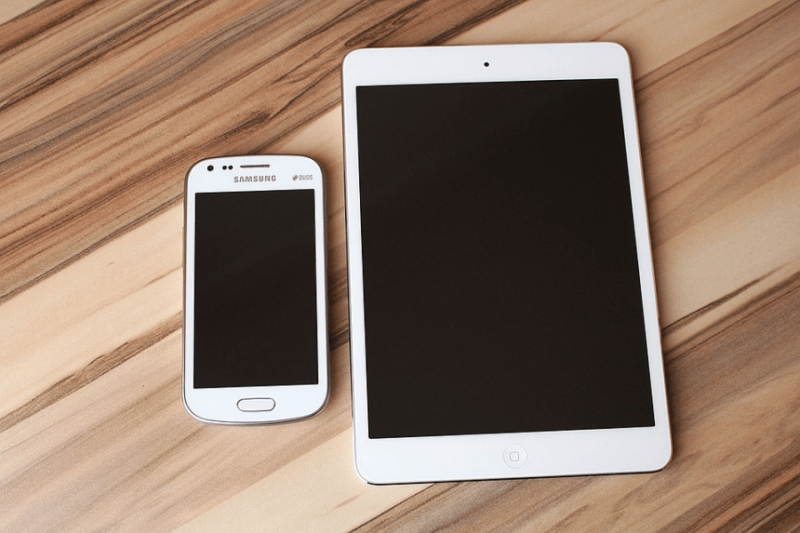
It’s easy to justify the use of smart devices in the bedroom. Smartphones especially are very useful; you can use it as an alarm clock, you can take emergency calls from work or family without even getting out of bed, and you can even run a plethora of sleep-related apps. However, the bottom line is that electronics in the bedroom are just not conducive to sleep. It’s because they are a source of artificial light, which messes with the body’s melatonin production schedule. More than that, they are the ultimate distraction! You don’t need to look at your Facebook, Instagram or Twitter feed, but when you hear a notification, it’s almost automatic for you to reach for your phone and check it out.
If you just can’t completely eliminate electronic devices from your bedroom, at least put them on airplane mode when you sleep. That way, you won’t get notifications while you sleep. The devices won’t light up and it won’t make a sound—until your alarm buzzes, anyway.
#2 Work and Study Materials
Work belongs in the office! Sometimes, though, taking it home with you is unavoidable—you may have a big presentation due the next day, or you may need to catch up after a few days of being sick. You may even be a freelancer or a someone that works from home entirely. Whatever the case may be, there is still no reason to bring work into the bedroom. Why?

Well, if you’re working or studying, you’re probably using a an electronic device—see #1. Even if you’re not, poring through spreadsheets and reports printed on paper still needs some sort of artificial light if you’re working after daylight hours. Another thing that you want to avoid is associating work and work-related tasks with your bedroom—that’s not what the room is for, after all. You don’t want to be thinking of work while you’re trying to sleep.
If you must work in your bedroom, set a schedule for it, sit at a desk—better if it’s one that can be folded and tucked away when not in use—and put away everything work-related after you’re done. Don’t leave things strewn about.
#3 Books and Magazines
Here’s another controversial piece of advice. It’s even harder to understand this because reading books in the bedroom is something that is usually thought of as natural. It’s common to have one or a few books on your bedside table. Parents even read children bedtime stories before tucking them in! Why doesn’t reading material belong in the bedroom?
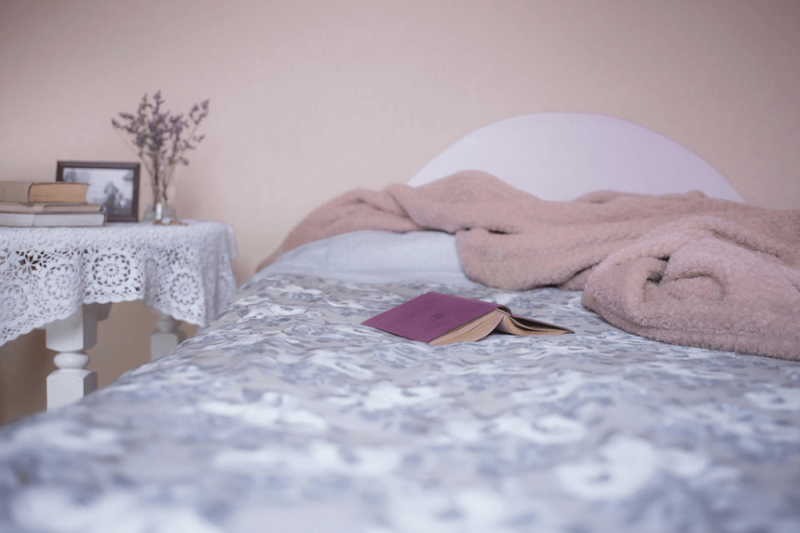
The answer may seem repetitive: It requires artificial light during nighttime hours, and it’s something that doesn’t involve sleeping or sex. That’s really the basis of this whole list. However, a little bit of light reading is something that some people find relaxing and even a good way to induce sleep. The problem is that sometimes a book is just too good to put down, and you end up losing sleep because you keep on telling yourself that you’re going to read “just one more chapter”. A good compromise is to read outside the bedroom.
If you insist on reading in bed, at least keep just one book on your bedside table. Move books you’ve already read—and magazines that you’ve been meaning to read, but just never get to—to a different part of the house or put them in storage.
#4 Beauty and Hygiene Products
A good rule to follow when it comes to where to put things in your home is to store them near where you use them. The problem lies in the fact that most of the time, we do too many things in the bedroom that we should be doing somewhere else! This is usually the case when it comes to makeup and other beauty or hygiene products, and it’s made even worse by the tendency of these products to pile up.
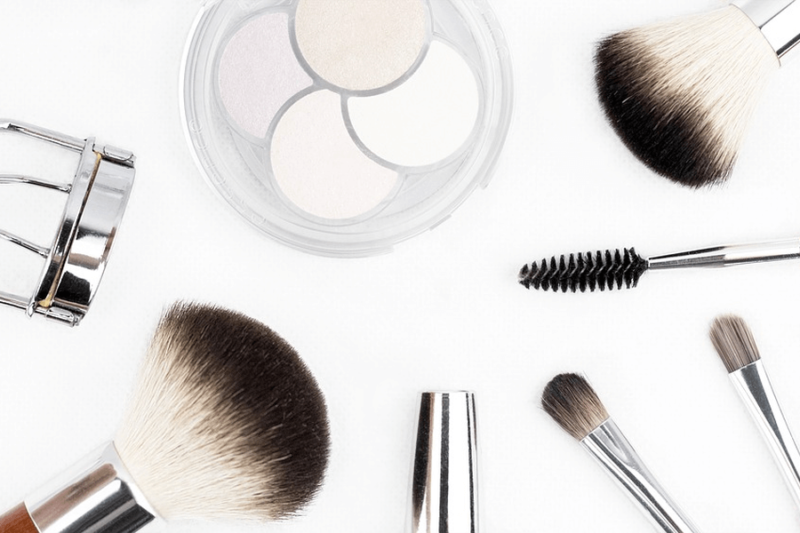
Anything that you put on or use right after a bath—lotion, astringent, deodorant—should be in the bathroom. Hair products should be near where you dry your hair. Makeup should be by the mirror you use. If the mirror is in your bedroom, consider setting up somewhere else! After all, you don’t want to get powder or some other foreign substance on your sheets, right?
#5 Food and Drinks
This just plain common sense. Eating and drinking on or near your bed is unhygienic. It increases the chances of your bedroom becoming dirty or infested—crumbs and spills are not completely unavoidable, even it you are a careful and neat person. Food and drinks should not be part of your sleep routine—if you drink sleep teas, do it in the kitchen before heading to bed—and should not be in your bedroom.
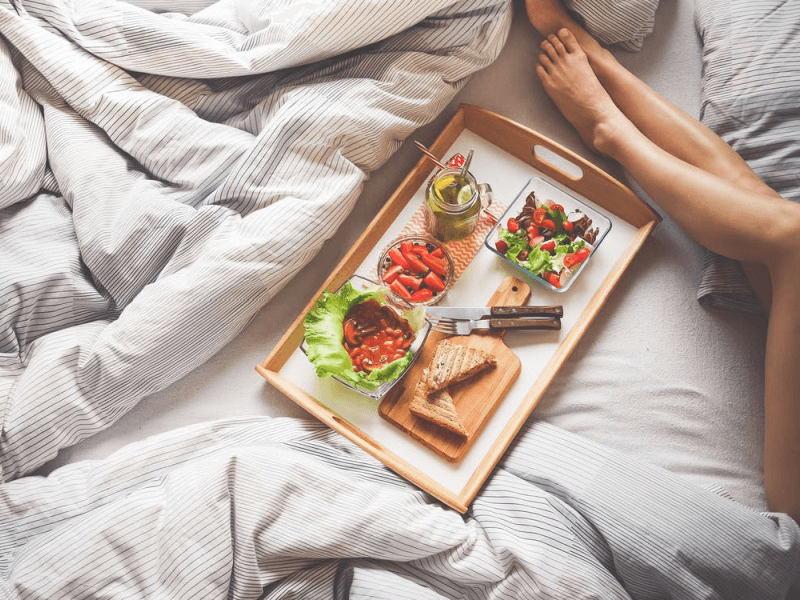
While breakfast in bed is a great surprise for birthdays and other occasions, this should not a regular occurrence unless absolutely necessary. If you’re too sick to get out of bed, then there’s no other recourse. But if there’s nothing stopping you from eating someplace more appropriate, making eating in the bedroom a habit not only disrupts your sleep cycle, but also affects your physical health. Watch out for unwanted weight gain.
#6 Pets
We can hear pet owners grumbling already. If you’re serious about creating an ideal bedroom environment, it’s best to let sleeping dogs lie… elsewhere. This goes for cats, too! This is another one of those things that should be common sense. Pets can track dirt and pollen, can carry fleas and ticks, and can shed fur and dander all over your bedroom. Not good, especially if you or your partner are prone to allergies. If you allow them on your bed—or if they jump on the bed while you’re asleep—you can add motion transfer and lack of space to the list of reasons why this can be a bad idea.

There are many health advantages to having a pet, but when it comes to sharing the bed with them, this issue is debatable. No matter what veteran pet owners may say, the fact of the matter is that most people that don’t find their sleep interrupted by pets in their bedroom are likely deep sleepers, devoid of physical hypersensitivities—or owners of huge California king beds. The emotional bond you have with your pet may be enough to overcome some sneezing and tossing and turning, but it may be that whatever’s gained mental health-wise is subtracted from sleep quality. If you really can’t handle not having your pet around while you sleep—and you’re noticing signs of faltering sleep hygiene due to co-sleeping with your furry friend—have them pick a spot on the floor or buy them a pet bed.
(Maria here, and let me just say that this is one rule that I have yet to implement in my own home! If you are finding this difficult to do, know that you are not alone.)
#7 Clothes and Shoes You Don’t Wear
How much of your bedroom storage space is eaten up by clothes and shoes? Now, what percentage of those clothes and shoes do you actually wear on a regular basis? Chances are, you’re holding on to too many pieces that are damaged in some way, too worn, no longer fit or are no longer in style. Yes, sentimental value is something that should be honored—but save that for a few important items, like a varsity jacket or a wedding dress. Keeping everything just makes you a pack rat.
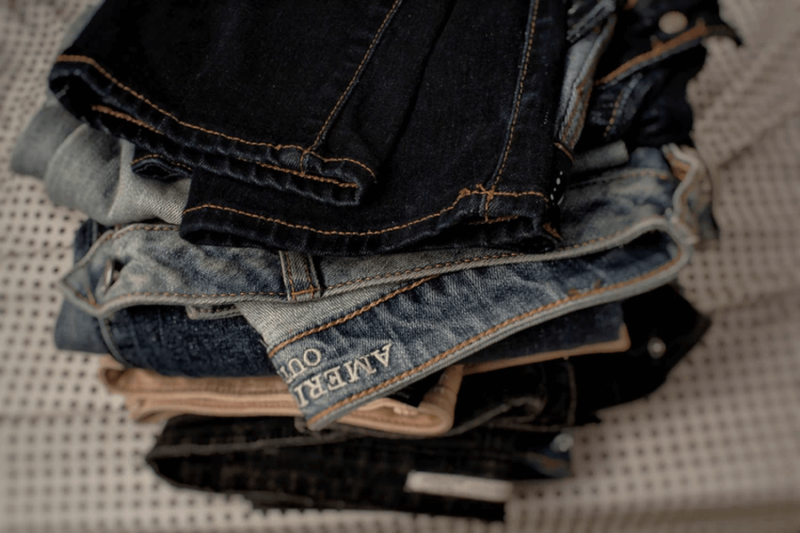
Your closet should ideally contain only clothes that you are currently using. If you have seasonal clothes, store them out of sight. The less clothes and shoes you have, the more you end up using the pieces you like. Actually, if you weed out all the pieces that you never really wear anyway, you’ll always be wearing something you like. Isn’t that better than holding on to stuff that doesn’t serve a purpose anymore? Let that negative energy go and allow your bedroom to breathe unencumbered by items just gathering dust.
Bonus: Less clothes also means less laundry; and less chance of your dirty clothes piling up somewhere on the floor or on a chair.
#8 Accumulated Nightstand Clutter
What’s on your nightstand right now? Typical residents of bedside tables include a few understandable essentials: alarm clocks, table lamps, potted plants, and personal items like reading glasses or a sleep mask. However, there is a tendency to dump whatever’s in your pocket onto your nightstand; which results in odd coins, lint, receipts, pens and other small items to accumulate and add to what’s already there. Add in the renegade teacup or two, a pile of books, jewelry you take off before you sleep, and more; now you have a veritable mess. Sound familiar?
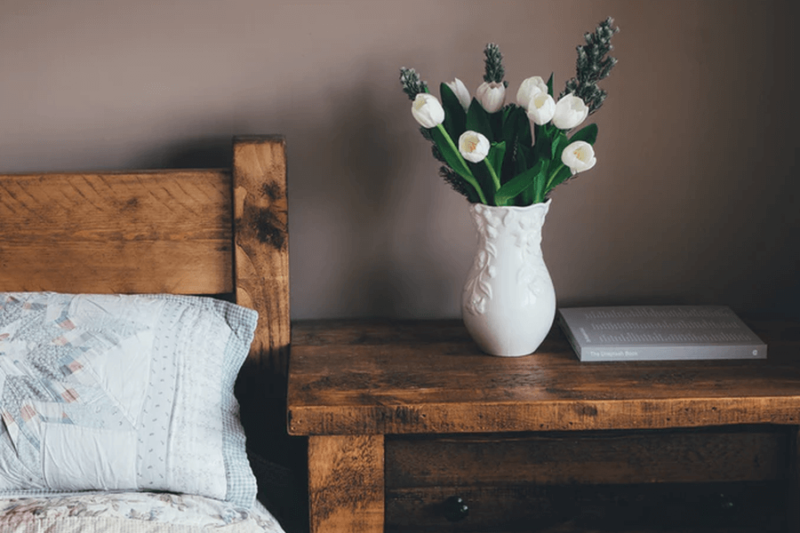
It is easy to treat your nightstand like that kitchen drawer or that living room chair. You know which ones I mean, and what they’re for—basically repositories of things you don’t know where else to put. Clutter is never healthy, but in the bedroom the stakes are higher. Try to keep your nightstand clean. Your well-rested mind and body will thank you for it in the morning.
#9 An Uncomfortable Bed
You may be putting off buying a new mattress because it’s beyond your budget, but if your bed is lumpy and sagging, you should really make replacing it a priority. Sleep is important! We spend so much time sleeping, and it’s how we recharge and rest. Think of it this way: If your smartphone charger was acting up, you’d replace it, right?
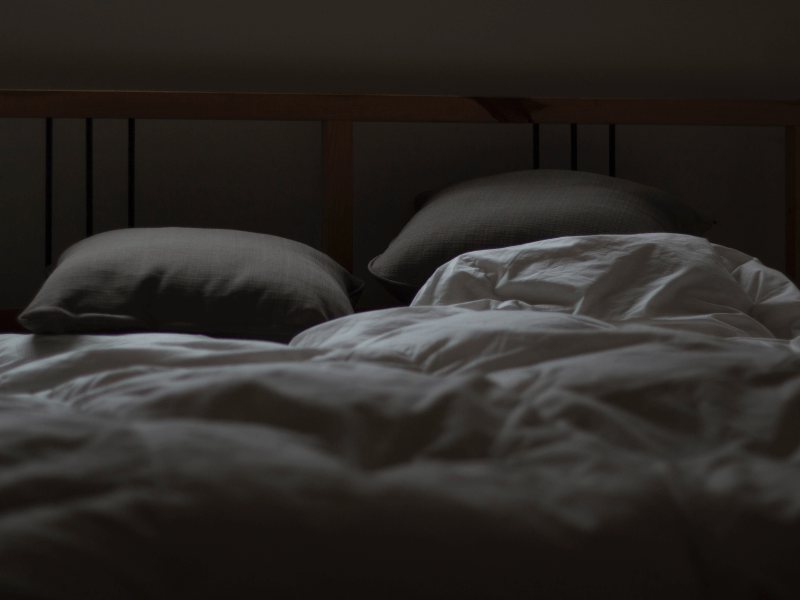
If you can’t take care of your mattress just yet, think about your pillows and bedding. Are the cushions flat? Are the linens yellowed and crispy? If so, you need to replace them, too. If you want to start making changes in your bedroom to encourage better sleep habits, your bed is the first thing you should upgrade.
#10 A Noisy or Active Bedmate
This is for those of you that share the bed with your partner. While you can’t just kick someone out of your life because they’re a chronic snorer or an active sleeper, it is worth considering separate bedrooms—or, at the very least, separate beds. Barring that, going to a sleep specialist is a must; as regular snoring and tossing and turning may be symptoms of more serious health problems.

This may sound extreme, but hear us out. The link between sleep disorders and disturbances to the quality of relationships has been studied, and it’s been found that when someone’s partner has a sleep disorder, chances are they will develop one themselves. For example: If your partner’s snoring keeps you awake at night enough times, you may eventually develop chronic insomnia. This is on top of relationship tension caused by both of you not getting quality sleep. In many cases, sleeping separately can actually help strengthen your bond and allow you to better support each other’s path to better sleep health.